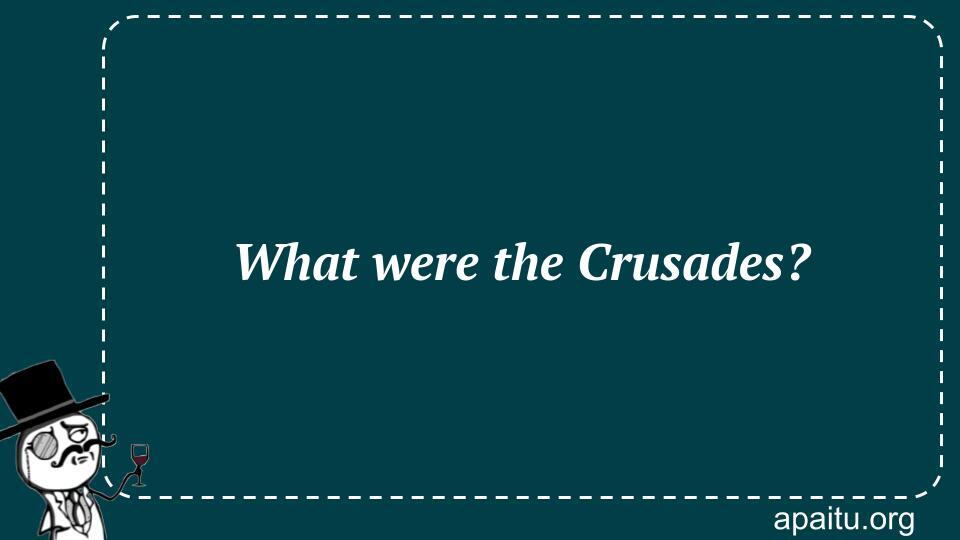Question
Here is the question : WHAT WERE THE CRUSADES?
Option
Here is the option for the question :
- Religious wars
- Trade routes
- Plagues
- A secret society
The Answer:
And, the answer for the the question is :
Explanation:
At least eight Crusades occurred, with the first occurring between 1096 and 1099 CE. These religious conflicts were waged between Christians and Muslims with the purpose of regaining the Holy Land and preventing further Muslim state growth in Christian territories of Europe and the Middle East. Crusading faded in the 16th century, although it had long-lasting consequences for religion in the region.

The Crusades, often referred to as religious wars, were a series of military campaigns waged by Christians in Europe during the Middle Ages. Spanning from the 11th to the 13th centuries, these expeditions were driven by religious fervor, political motivations, and a desire to reclaim and secure Christian holy sites in the Holy Land.
The roots of the Crusades can be traced back to the 11th century when Seljuk Turks began to expand their influence in the Middle East, posing a threat to the Byzantine Empire and Christian pilgrims traveling to Jerusalem. In response, Pope Urban II issued a call to arms in 1095, urging Christians to embark on a holy war to liberate Jerusalem and other sacred sites from Muslim control.
The First Crusade, launched in 1096, saw a massive wave of European knights, soldiers, and commoners embarking on a perilous journey to the Holy Land. After a long and arduous campaign, the Crusaders managed to capture Jerusalem in 1099, establishing Christian states in the region. However, these states faced constant challenges from Muslim forces, leading to subsequent Crusades in the following decades.
The Crusades were marked by their religious zeal but were also influenced by political and economic factors. Nobles and knights saw the opportunity to expand their territories, gain wealth, and secure land holdings in the East. Merchants and traders saw the potential for new trade routes and economic opportunities, leading to the rise of Crusader states that facilitated commerce between Europe and the Middle East.
Each Crusade had its own unique circumstances and objectives. The Second Crusade was launched in response to the fall of the County of Edessa to Muslim forces, while the Third Crusade aimed to recapture Jerusalem after its fall to Saladin, a renowned Muslim leader. The Fourth Crusade took an unexpected turn when Crusaders diverted their efforts towards Constantinople, sacking the city and causing a rift between Eastern and Western Christianity.
the Crusaders faced significant challenges throughout their campaigns. Harsh conditions, disease, and internal conflicts often plagued their expeditions. Furthermore, the Muslim forces, led by formidable leaders such as Saladin, successfully repelled Crusader advances and eventually reclaimed Jerusalem in 1187. Subsequent Crusades made limited gains, but the Christian presence in the Holy Land gradually diminished.
The long-lasting impact of the Crusades extends beyond military conquests. These religious wars fostered cultural exchange and introduced Europeans to the rich civilizations and knowledge of the Middle East. Muslim scholars preserved and expanded upon the works of Greek philosophers, transmitting this knowledge to Europe during and after the Crusades, contributing to the intellectual flourishing of the Renaissance.
The Crusades also left a lasting impact on European society. The influx of wealth, goods, and ideas from the East sparked economic growth and cultural transformation. Crusaders returning from the Holy Land brought back exotic goods, spices, and technologies, stimulating trade and influencing European tastes and customs. The Crusades also fueled religious fervor and shaped the concept of chivalry, leaving an indelible mark on medieval European society.
While the Crusades were complex and multifaceted, their legacy continues to be debated and analyzed. Scholars examine the motivations, consequences, and historical context of these religious wars, shedding light on the interactions between different cultures and religions during the Middle Ages. The Crusades remain a captivating and controversial chapter in history, evoking discussions about faith, power, and the complexities of intercultural relations.
the Crusades were a series of religious wars that unfolded over several centuries, driven by a mix of religious, political, and economic factors. These expeditions marked a significant period of European history, as Christians sought to reclaim and secure holy sites in the Holy Land. The Crusades had far-reaching consequences, shaping the dynamics between cultures, influencing trade and knowledge exchange, and leaving an indelible impact on the medieval world.